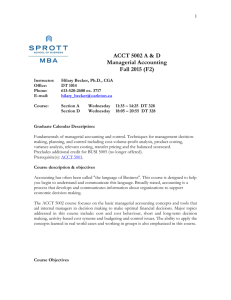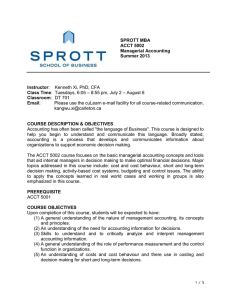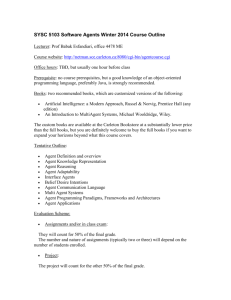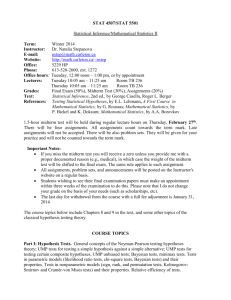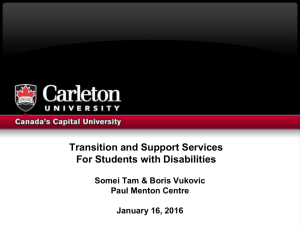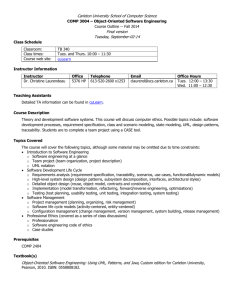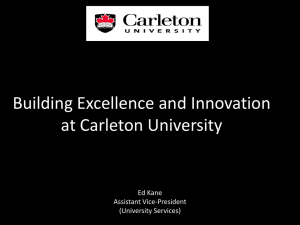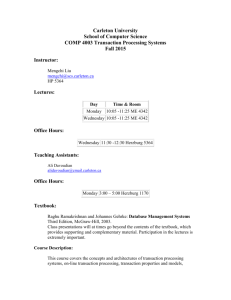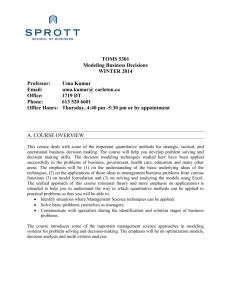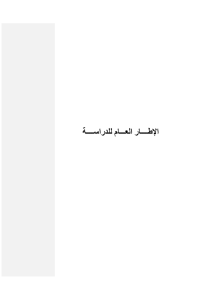ACCT 5002 A & B
advertisement
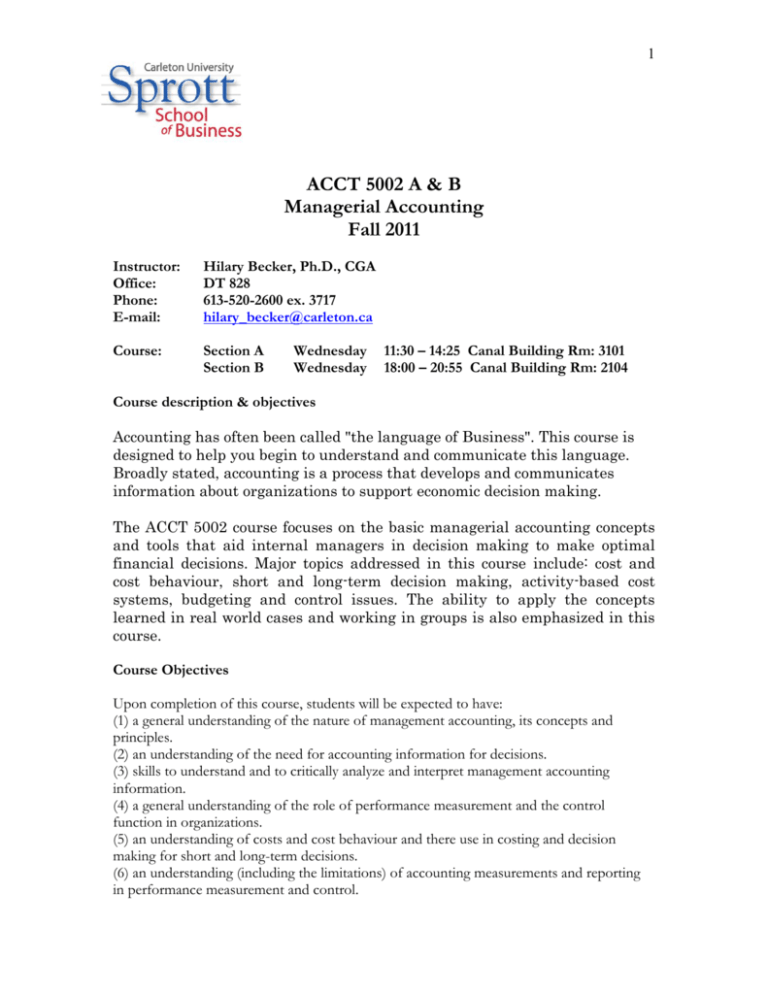
1 ACCT 5002 A & B Managerial Accounting Fall 2011 Instructor: Office: Phone: E-mail: Hilary Becker, Ph.D., CGA DT 828 613-520-2600 ex. 3717 hilary_becker@carleton.ca Course: Section A Section B Wednesday Wednesday 11:30 – 14:25 Canal Building Rm: 3101 18:00 – 20:55 Canal Building Rm: 2104 Course description & objectives Accounting has often been called "the language of Business". This course is designed to help you begin to understand and communicate this language. Broadly stated, accounting is a process that develops and communicates information about organizations to support economic decision making. The ACCT 5002 course focuses on the basic managerial accounting concepts and tools that aid internal managers in decision making to make optimal financial decisions. Major topics addressed in this course include: cost and cost behaviour, short and long-term decision making, activity-based cost systems, budgeting and control issues. The ability to apply the concepts learned in real world cases and working in groups is also emphasized in this course. Course Objectives Upon completion of this course, students will be expected to have: (1) a general understanding of the nature of management accounting, its concepts and principles. (2) an understanding of the need for accounting information for decisions. (3) skills to understand and to critically analyze and interpret management accounting information. (4) a general understanding of the role of performance measurement and the control function in organizations. (5) an understanding of costs and cost behaviour and there use in costing and decision making for short and long-term decisions. (6) an understanding (including the limitations) of accounting measurements and reporting in performance measurement and control. 2 Textbook Custom publication available at the bookstore for ACCT 5002 Grading Scheme ACCT 5002 Participation Individual Assignment Test Hand-in Cases – group 10% 15% 50% 25% In the ACCT 5002 course, there will be one individual case assignment and two group case assignments designed to integrate the material from the course to be submitted in groups of no more than 2 students. The cases are due at the beginning of the class assigned to submit the case. Participation is critical in a course like this. To gain a full understanding of the material, students are expected to participate in each class. Learning outcomes are enhanced when students share experiences and knowledge. EXAMINATION There will be one examination scheduled during the examination period which will encompass all the material from ACCT 5002. METHOD OF INSTRUCTION Class sessions entail a mixture of lecture, case study, problem analysis, and class discussion. Lectures emphasize major topics and concepts. It requires active learning, which means that the student must take responsibility for the learning that takes place. You are encouraged to ask questions and to stimulate discussion on topics that you have difficulty understanding. How to do well in this course: COME TO CLASS, COME TO TUTORIALS AND PRACTICE, PRACTICE, PRACTICE… To perform well in this course, you must spend time answering extra problems and checking the answers to test their understanding. To maximize your learning, you should make an honest attempt at the question before peeking at the solution. Simply reading a question and then turning to the solution right away is next to useless. You will find that there is likely to be a direct correlation between the number of problems you prepare, your attendance in class and your course grade. 3 Class Etiquette 1. 2. 3. 4. 5. Late arrival should be an exception. When necessary, sit on entering side; do not disturb the class. Early departure should be an exception also. Early preparation for departure - please don't. Talking - with everyone or with no one. Cell phones and other electronic noises....off. Topical Coverage ACCT 5002 Week Topic 1 Cost and Cost Behaviour/Cost-Volume –Profit Analysis 2 Product Costing and Activity Based Costing Chapter 1 and 2 Cases 3 and 4 3 Budgeting 5 4 5 6 Variance Analysis Short-run Decision Making Performance Measurement and the Balanced Scorecard 6 7 8 and 9 Precision Worldwide Presteige Telephone Destin Brass Miles High Cycle Chadwick (read for class) IMPORTANT ADDITIONAL INFORMATION REQUIRED CALCULATOR IN MGMT COURSE EXAMINATIONS Only Texas Instruments BA II Plus calculators will be permitted in all Business course examinations. This calculator is available in the campus bookstore (1st floor, University Centre) and at various other off-campus retail stores. GROUP WORK The Sprott School of Business encourages group assignments in the school for several reasons. They provide you with opportunities to develop and enhance interpersonal, communication, leadership, follower-ship and other group skills. Group assignments are also good for learning integrative skills for putting together a complex task. Your professor may assign one or more group tasks/assignments/projects in this course. If you have a group assignment you may find the resources at http://sprott.carleton.ca/academic_programs/groupwork useful. 4 Before embarking on a specific problem as a group, it is your responsibility to ensure that the problem is meant to be a group assignment and not an individual one. MEDICAL CERTIFICATE Please note that in all occasions that call for a medical certificate you must use or furnish the information demanded in the standard university form. http://www.carleton.ca/registrar/forms/Med_Cert_Carleton_University.pdf PERSONS WITH DISABILITIES Students with disabilities requiring academic accommodations in this course are encouraged to contact a coordinator at the Paul Menton Centre for Students with Disabilities to complete the necessary letters of accommodation. After registering with the PMC, make an appointment to meet and discuss your needs with me at least two weeks prior to the first in-class test or ITV midterm exam. This is necessary in order to ensure sufficient time to make the necessary arrangements. Please refer to http://www.carleton.ca/pmc/ for all PMC information. RELIGIOUS OBSERVANCE Students requesting academic accommodation on the basis of religious observance should make a formal, written request to their instructors for alternate dates and/or means of satisfying academic requirements. Such requests should be made during the first two weeks of class, or as soon as possible after the need for accommodation is known to exist, but no later than two weeks before the compulsory academic event. Accommodation is to be worked out directly and on an individual basis between the student and the instructor(s) involved. Instructors will make accommodations in a way that avoids academic disadvantage to the student. Students or instructors who have questions or want to confirm accommodation eligibility of a religious event or practice may refer to the Equity Services website for a list of holy days and Carleton’s Academic Accommodation policies, or may contact an Equity Services Advisor in the Equity Services Department for assistance. PREGNANCY Pregnant students requiring academic accommodations are encouraged to contact an Equity Advisor in Equity Services to complete a letter of accommodation. The student must then make an appointment to discuss her needs with the instructor at least two weeks prior to the first academic event in which it is anticipated the accommodation will be required. PLAGIARISM The University Senate defines plagiarism in the regulations on instructional offenses as: “to use and pass off as one’s own idea or product work of another without expressly giving credit to another.” 5 Borrowing someone else’s answers, unauthorized possession of tests or answers to tests, or possession of material designed in answering exam questions, are also subject to university policy regarding instructional offenses. For more information on Carleton University’s Academic Integrity Policy, consult: http://www.carleton.ca/studentaffairs/academic_integrity The photocopying of substantial portions of a textbook (e.g. more than 1 chapter or 15% of the total page count) without the publisher's permission is another misuse of intellectual property, and is also a violation of Canadian copyright law. Access Canada's web site provides guidelines on legitimate copying. You may also find helpful information at: http://library.wlu.ca/access/guidelines.htm
